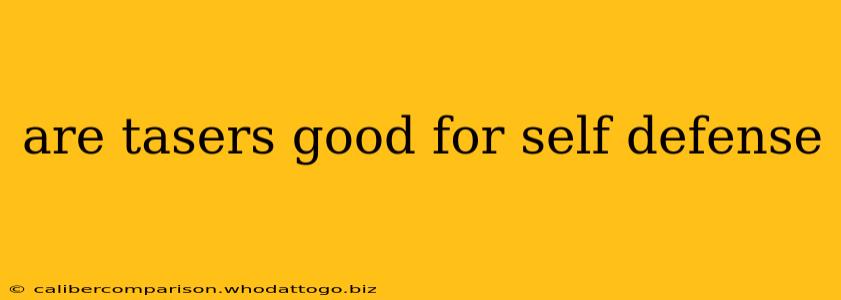Tasers have become increasingly popular as a self-defense tool, but are they truly effective and are they legal to carry and use? This article delves into the pros and cons, exploring their practical application and the potential legal consequences. We'll analyze their effectiveness in various scenarios and offer insights to help you make an informed decision.
How Effective Are Tasers for Self-Defense?
The effectiveness of a Taser for self-defense depends heavily on several factors, including:
- Distance: Tasers have a limited range, typically 15-20 feet. If an attacker is closer, the chances of successful deployment significantly decrease.
- Target: Clothing can impede the effectiveness of a Taser. Thick clothing, or even multiple layers, can prevent the probes from making proper contact and delivering the electrical charge.
- Accuracy: Successfully deploying a Taser requires accuracy. Stressful situations can impair aim, reducing the probability of a successful incapacitation.
- Physical Condition of the Attacker: A determined attacker under the influence of drugs or alcohol might be less susceptible to the effects of a Taser. Someone with a high pain tolerance may also continue their attack.
- Multiple Attackers: Tasers are generally less effective against multiple attackers, as you may only be able to target one person at a time.
While Tasers can incapacitate an attacker, they are not foolproof. It's crucial to understand their limitations and not rely on them as the sole means of self-defense.
Advantages of Tasers for Self-Defense:
- Non-lethal (Ideally): Tasers are designed to incapacitate, not kill. While there are rare cases of death associated with Taser use, the intention is to provide a non-lethal option.
- Less Physical Force Required: Compared to physical self-defense techniques, a Taser requires less physical strength and exertion from the user.
- Potential for Quick Disengagement: A successful Taser deployment can create an opening for escape.
Disadvantages of Tasers for Self-Defense:
- Limited Range and Accuracy: As mentioned earlier, the limited range and the need for accurate aiming are significant drawbacks.
- Malfunctions: Like any electronic device, Tasers can malfunction.
- Legal Ramifications: The legal implications of using a Taser for self-defense can be complex and vary widely depending on jurisdiction.
- No Guarantee of Incapacitation: There's no guarantee that a Taser will effectively incapacitate an attacker.
Legal Aspects of Taser Use for Self-Defense
The legality of using a Taser for self-defense varies considerably by state and even local jurisdictions. Some areas have specific laws regarding the use of less-lethal weapons like Tasers, while others may fall under general self-defense statutes.
Before purchasing or carrying a Taser, it is absolutely critical to research and understand the laws in your specific location. Factors such as the perceived threat level, the use of reasonable force, and the attacker's actions all play a role in determining the legality of your actions. Ignorance of the law is not a defense. Consulting with a legal professional specializing in self-defense law is highly recommended.
Alternatives to Tasers for Self-Defense
Tasers shouldn't be considered a panacea for self-defense. A multi-layered approach is often recommended. This might include:
- Self-defense training: Learning effective self-defense techniques can greatly improve your ability to protect yourself.
- Situational awareness: Being aware of your surroundings and avoiding potentially dangerous situations is crucial.
- Personal alarms: These can alert others to a potential threat.
- Pepper spray: A less-lethal option that can incapacitate an attacker.
Conclusion: Weighing the Risks and Benefits
Tasers offer a potential non-lethal option for self-defense, but their effectiveness is far from guaranteed. Their limited range, accuracy requirements, and the potential for malfunctions need careful consideration. Furthermore, the legal ramifications of using a Taser must be thoroughly investigated based on your specific location. A comprehensive self-defense strategy should incorporate a variety of techniques and considerations, and consulting with legal and self-defense professionals is strongly advised. Remember that your safety and well-being are paramount, and making informed decisions is key.

